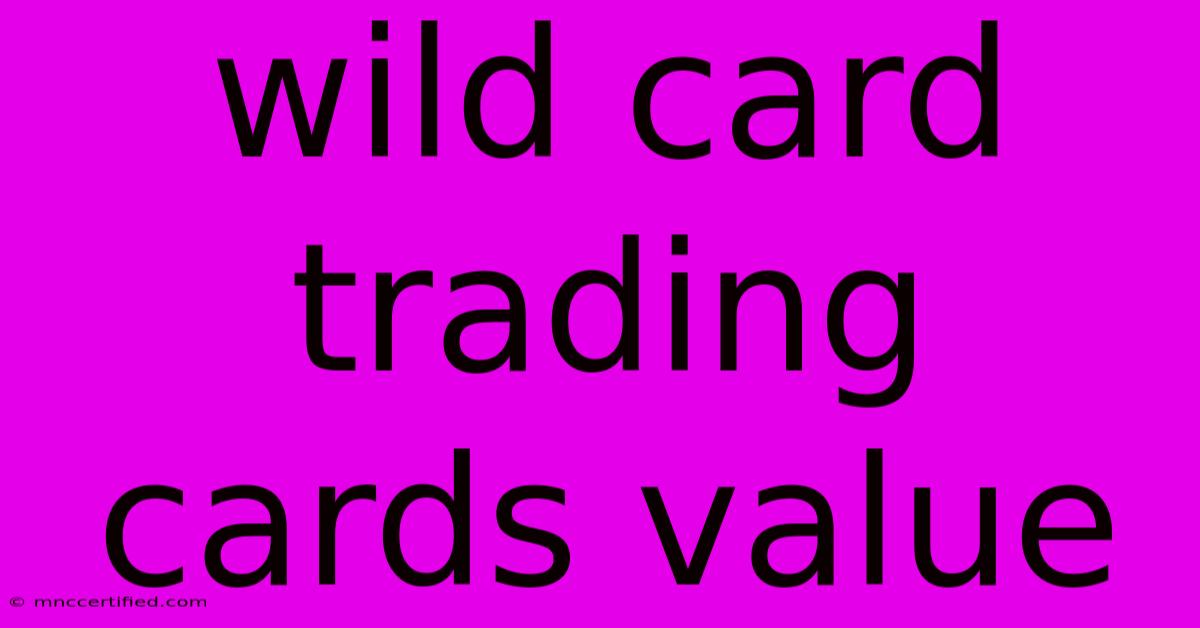Wild Card Trading Cards Value

Table of Contents
Wild Card Trading Cards: Value, Rarity, and Investment Potential
The world of trading cards is vast and exciting, with countless sets and variations driving a passionate collector's market. Within this vibrant landscape, "wild cards" – often representing unique characters, game mechanics, or special events – occupy a unique space, often commanding significant value. This article delves into the factors that influence the value of wild card trading cards, helping you understand how to assess their worth and potentially capitalize on their investment potential.
Understanding the Wild Card Phenomenon
"Wild card" isn't a universally standardized term in the trading card world. It typically refers to cards that deviate from the standard set, possessing unique characteristics that set them apart. These might include:
- Rare Variants: Cards with altered artwork, foil treatments, or special printing techniques. These often have a limited print run, driving up scarcity and value. Think one-of-a-kind sketches or autographed cards.
- Promotional Cards: Cards given out at events, conventions, or as part of special promotions. These often feature unique designs and are highly sought after by collectors.
- Error Cards: These are cards with printing errors, miscuts, or other imperfections. While seemingly negative, these errors can make a card exceptionally rare and valuable, particularly if the error is significant and noticeable. Consider miscut cards or cards with printing flaws.
- Game-Changing Mechanics: In collectible card games (CCGs), wild cards might represent powerful abilities or unique characters that significantly impact gameplay. Their in-game value translates directly into collector value, especially in competitive scenes.
Factors Affecting Wild Card Trading Card Value
Several key factors interact to determine the value of a wild card:
- Rarity: The lower the print run, the higher the potential value. Extremely rare cards, like unique promotional cards or cards with significant printing errors, can become highly prized.
- Condition: The card's condition is paramount. Grading services like PSA and Beckett use a standardized scale to assess a card's condition, directly impacting its value. A perfectly centered card in mint condition will fetch far more than a damaged or poorly centered one.
- Demand: High demand from collectors drives up prices. Popular characters, iconic artwork, or cards from highly sought-after sets will naturally command higher values. The popularity of the character or franchise plays a major role.
- Grading: Professional grading adds legitimacy and transparency, making it easier to establish a card's value. A card graded by a reputable service like PSA often sells for significantly more than an ungraded card. A high PSA grade is essential for maximizing value.
- Market Trends: The overall trading card market fluctuates, influencing the value of all cards, including wild cards. Following market trends and understanding the cyclical nature of the hobby is crucial.
Identifying and Appraising Wild Card Value
Determining the value of your wild cards requires research and careful assessment:
- Online Marketplaces: Sites like eBay, COMC, and specialized trading card marketplaces provide valuable data on recent sales of similar cards. This allows you to establish a market price range.
- Price Guides: While not always perfectly accurate, price guides offer a general idea of card values. However, always compare to actual sales data.
- Collector Forums and Communities: Engaging with experienced collectors can provide insights into the value and rarity of specific wild cards. These communities offer expert opinions and up-to-date market information.
Investing in Wild Card Trading Cards
Investing in trading cards, including wild cards, carries inherent risks. However, with careful research and a long-term perspective, it can be a rewarding venture. Consider these factors:
- Diversification: Don't put all your eggs in one basket. Diversify your investment across different sets, characters, and card types.
- Due Diligence: Thoroughly research the cards you plan to purchase, understanding their rarity, condition, and market demand.
- Long-Term Perspective: The value of trading cards can fluctuate greatly in the short term. A long-term approach is generally recommended.
Wild card trading cards represent a fascinating segment of the collecting world, offering unique opportunities for enthusiasts and investors alike. By understanding the factors influencing their value and conducting thorough research, you can navigate this dynamic market and potentially reap significant rewards. Remember, careful assessment, diligent research, and a long-term strategy are key to success in this exciting hobby.

Thank you for visiting our website wich cover about Wild Card Trading Cards Value. We hope the information provided has been useful to you. Feel free to contact us if you have any questions or need further assistance. See you next time and dont miss to bookmark.
Featured Posts
-
Fake Insurance Card For Court
Nov 29, 2024
-
Des Moines Insurance Agencies
Nov 29, 2024
-
Trading Card Shops In Chicago
Nov 29, 2024
-
Goosehead Insurance Las Vegas
Nov 29, 2024
-
Trading House Creek Reservoir
Nov 29, 2024